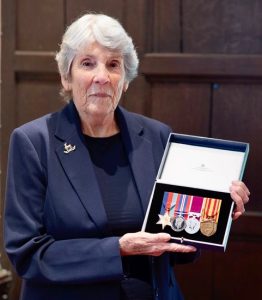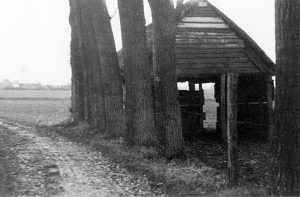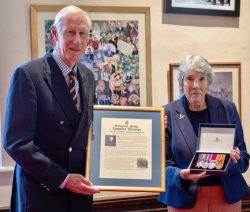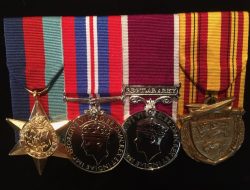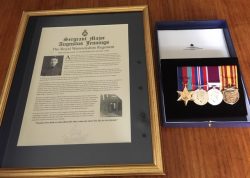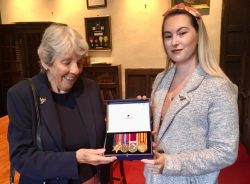Local Hero’s Medals Presented 80 Years On
“It is absolutely wonderful to have some recognition for my father’s brave sacrifice during the war, and for the family to finally have his campaign medals after all this time,” said Diane Norton, the daughter of Company Sergeant Major Augustus Jennings, at a special ceremony at the Fusiliers Museum in Warwick. A full set of the campaign medals her father’s family should have received was presented by the Chair of the Museum Trustees, Lt Col John Rice, along with a framed citation describing CSM Jennings’ outstanding act of bravery during the Second World War.
Augustus Jennings had sacrificed his own life attempting to save his men of the Royal Warwickshire Regiment at the notorious Wormhoudt Massacre of British soldiers by the SS during the retreat to Dunkirk in 1940, an incident that was unreported for many years.
With some other men from the Gloucesters and the Worcesters and some French soldiers, the Warwicks had been grimly holding up the German advance, under orders to ‘resist to the last bullet’, allowing more than 300,000 British troops to escape from the beaches. When they ran out of ammunition they surrendered and became prisoners of war. But their captors were the elite Hitler bodyguard unit of the Waffen SS.
They herded the men into a small barn, began shooting them and threw in grenades. One of the survivors was to relate after the war that CSM Augustus Jennings threw himself on to the first grenade and was killed instantly. Out of nearly a hundred men, only five survived to tell the tale.
Unlocking Warwick established that three local men were among those murdered that day – Tom White from Market Street, Thomas George from Lakin Road, and Arthur Williams who worked at Warwick Aviation before enlisting. But Augustus Jennings’ name is not on the memorial, so the researchers did not know about his involvement. His great-granddaughter saw the subsequent article in the local paper about ‘The Forgotten Massacre’ and put the researchers in touch with her ‘Nan’, Diane Jennings-Norton, the daughter of CSM Jennings, now in her eighties and living in Plymouth.
Diane was born in Warwick when her father, a career soldier, was living at Budbrooke Barracks. When he left for France in 1939 the family moved back to Rugby where Augustus had been born. His name is on the war memorial there. Diane has been campaigning to receive her father’s medals since she discovered the truth about his death when journalists uncovered the story in 1988. The Ministry of Defence said too much time had elapsed for the issuing of WW2 medals.
Unlocking Warwick’s Secretary, Rick Thompson said, “The Warwick Courier reported her appeal prominently, and the Royal Regiment of Fusiliers Museum and the Royal Warwickshire Regimental Association responded immediately. They found replicas of the medals the family had never received, and a ‘court mounted’ set with a framed certificate describing Sgt. Major Jennings’ outstanding bravery were presented to his daughter. The quotation from John’s Gospel on the citation has seldom been more appropriate – Greater love hath no man than this that a man lay down his life for his friends”.Lt Col Rice said, “The museum was delighted to source the medals that were due to Augustus Jennings’ family, and we are grateful to the Warwickshire Regimental Association for funding their acquisition.
“The four medals are the 1939-45 Star, the 1939-45 War Medal, the Long Service and Good Conduct Medal, and the original Dunkirk Medal that had been given to Diane when she visited the site of the massacre in France some years ago. All have been mounted in a blue leather case embossed with the name of WO2 (Warrant Officer Class Two) Jennings, and the regimental crest – the antelope.”
Diane Norton, who was accompanied by her granddaughter, Grace Jenkins, said, “We are deeply grateful and moved by this generous gesture from my father’s regiment. I really wanted my grandchildren to have the medals my father never received, and to know about his bravery. The medals and the certificate about Augustus’ life are beautifully presented and will be treasured for many years to come.
“I feel like I’ve completed his story now. He was killed 80 years ago, but no one admitted the massacre and we had no idea how he had died on the road to Dunkirk until I saw my father’s picture on a TV investigation programme and the details finally emerged”.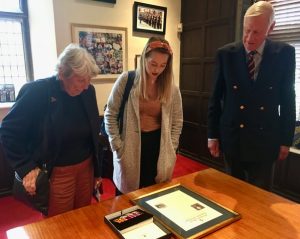
Lt Col Rice said the museum would also provide a set of miniature medals for Augustus Jennings’ great-granddaughter, Grace, to keep. He said, “Diane Norton was interested to hear that The Royal Regiment of Fusiliers Museum (Royal Warwickshire) is to relocate from St John’s House to Pageant House in Jury Street, Warwick, sometime in the next two years. This exciting development provides the opportunity to bring the fascinating stories of the Regiment’s 350-year history, including the story of the Wormhoudt Massacre, to the very heart of the county town. We rely on donations to support this self-funded museum. If readers would like to help, they should visit our website: http://www.warwickfusiliers.co.uk/pages/pg-35-online_donations/ ”.


